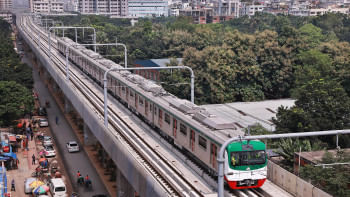The inauguration of an urban dream

Prime Minister Sheikh Hasina is going to inaugurate the country's first-ever elevated metro rail in Dhaka today, in what is set to be one of the biggest achievements of her government and a proud moment for us as a nation. We would like to extend our heartiest congratulations to the government, to those who worked on this project, our foreign partners, and all other stakeholders who turned this dream into a reality. It has been a long and arduous journey since construction of the Mass Rapid Transit (MRT) Line-6 began back in June 2016. And even though only a small section of the metro rail is going to be ready for commercial operation from December 29, we hope that the momentum it creates will lead to the timely completion of other sections, as well as that of complementary infrastructure that could truly turn it into a game-changer for the capital's public transport system.
After the PM's official inauguration today, starting tomorrow, commuters will be able to use the MRT Line-6 from Uttara to Agargaon. The eight-kilometre section from Agargaon to Motijheel would be opened in December next year, and the Motijheel to Kamalapur section in June 2025. Initially, the trains would run for four hours a day, from 8am to 12pm.
Clearly, the benefits of the metro rail are many. First and foremost among them are its speed and efficiency. Secondly, more comfortable, modern amenities, such as air-conditioning and Wi-Fi are going to be offered. Additionally, the trains will ferry up to 60,000 passengers per hour, and will also be more environmentally-friendly since they run on electricity. However, the question remains: is the introduction of the metro rail going to be enough to ease the suffering of Dhaka dwellers, who have already paid a hefty price due to the traffic congestion the project's construction has already caused in key areas of the capital?

For people to truly benefit from the metro rail, we need to develop a multi-medium integrated communication system centring it. The government also needs to invest in public transport and work on the Dhaka Bus Rapid Transit (BRT) project to decrease people's dependence on private cars. According to experts, even when all six lines of the metro rail will be fully functional, it will only be able to serve 20 percent of the demand at the time. As such, it won't be enough to address Dhaka's ever-increasing traffic woes, unless we make other crucial cost- and time-effective interventions.
The effectiveness of the metro rail will depend on the efficacy of the planning to determine how people will reach the stations or go to various destinations around the stations. When it came to the construction of the metro rail, poor planning and unwanted delays on the part of authorities led to a lot of suffering for commuters and general citizens. While development projects such as the metro rail are vital to take our national infrastructure to the next level, these big ambitions must be supplemented with equally high levels of competence. And even though today's inauguration will be a proud start and a big achievement, there is much more that the authorities need to do to truly turn the Dhaka Metro Rail into something that could positively revolutionise the lives of our people.

 For all latest news, follow The Daily Star's Google News channel.
For all latest news, follow The Daily Star's Google News channel. 








Comments